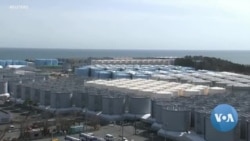Pushing back against Japan’s plan to release nuclear wastewater into the Pacific Ocean.
Welcome to VOA Asia Weekly. I'm Chris Casquejo in Washington. That story is just ahead, but first, making headlines:
Japan is preparing to evacuate nationals out of Sudan, where fighting continues between forces loyal to Sudan’s top two generals. Japan’s Chief Cabinet Secretary said the Defense Ministry is preparing to evacuate about 60 Japanese citizens.
North Korean leader Kim Jong Un has called for the launch of a spy satellite, state media reported on Wednesday. Kim discussed the plan during a visit with his daughter to the country's National Aerospace Development Administration on Tuesday.
Two New York City residents arrested by the FBI on Monday for allegedly operating a secret illegal police station for China’s national police in the city’s Chinatown were released on bond following their initial court appearance. Lu Jianwang and Chen Jinping, face charges of conspiring to act as agents of China's government without informing U.S. authorities, and obstruction of justice.
Foreign ministers from the Group of Seven nations condemned Russia’s war in Ukraine and highlighted the need to engage with China to address global challenges as they closed their meetings in Japan on Tuesday. While noting the importance of working with China on issues such as climate change and global health security, the ministers expressed concerns in a joint communique about China’s actions in the East and South China Seas and its stance toward Taiwan.
Japan’s request to release nuclear wastewater from the disabled Fukushima Daiichi Nuclear Power plant is getting pushback from the Pacific Island nations. During the recent G7 Environment Ministers meeting, that effort gained additional momentum – among environmentalists around the world. VOA’s Jessica Stone reports.
The Pacific Islands region is home to millions of marine animal species. Experts say some 44 percent are endangered or under threat. It’s also home to people who make their living off the bounty of the sea.
“The ocean is life. The ocean provides almost everything that we need for livelihood because we are ocean states.”
Kiribati Ambassador Teburoro Tito says that is why people of the region are concerned about a proposal by Japan’s nuclear power company – TEPCO – to release more than a million metric tons of treated nuclear wastewater from the Fukushima plant into the Pacific.
Japanese officials maintain they can make the water safe.
"The continued progress in decommissioning efforts, including the release of Advanced Liquid Processing System treated water into the sea, as well as Japan's science-based and transparent approach, has been appreciated."
The International Atomic Energy Agency says Japan is running out of storage space for the water and is following recommended safety standards for treating the contaminated water.
But at a recent gathering of Group of Seven environment ministers, Germany's top environment official refused to endorse the plan.
"It is obvious that ministers of environment cannot support the feeding back of contaminated substances into water anywhere in the world.”
"This release is absolutely unprecedented in terms of the scale. There have been limited releases, but they were part of regular kind of running of plants. And, you know, I would not actually say that I'm comfortable with even the releases that have happened."
Ivana Nikolic Hughes is a chemical engineer who directs Columbia University’s nuclear research in the Marshall Islands.
It was here that the United States conducted 67 nuclear tests between 1946 and 1958. Nikolic Hughes says more than 60 years later, her research team found radioactive elements in the coconuts here.
“The radiation is still there. And I think for me, you know, the big lesson is there's no such thing as this kind of safe use or safe testing.”
In February, the Pacific Islands Forum met with TEPCO, demanding additional studies of the decontamination process — to assure members the release won’t poison the water or the wildlife.
“If the wastewater is released into the ocean, it must be safe. It must not impact adversely on the lives of the people.”
TEPCO has so far delayed the release, giving opponents more time to push for other options. Nikolic Hughes says one alternative should be locating additional storage tanks to house the nuclear wastewater until the radioactive isotopes break down further.
Jessica Stone, VOA News.
Visit voanews.com for the most up-to-date stories.
Thanks for watching VOA Asia Weekly. I’m Chris Casquejo. Until next week.
We leave you with a major conservation milestone. A zoo in Thailand's northeast region announced on Sunday that a red-headed vulture hatched last month, making it the first successful breeding of this species in Thailand in 30 years, and only the second instance worldwide. Welcome, baby bird!











